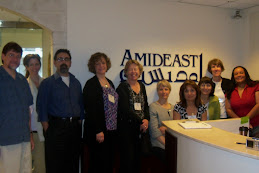June 6, 2010
Yesterday, we arrived in Doha, the capital of Qatar. Qatar is a tiny country; in terms of area, it is a little smaller than Connecticut. The latest statistics say the population is about 1.6 million. Someone told us today that only about 250,000 or so of those people are nationals (the Qatari people who come from here.) The rest are temporary workers from other countries, especially southeast Asians. The landscape and the population are changing rapidly. The population has more than doubled in the last 5 years. Our local guide told us that the downtown skyline of high rise buildings simply wasn’t there 5 years ao.
Qatari is similar to UAE in having a huge imbalance of foreign vs. nationals in the population. It is also similar in being a desert country with little in the way of natural resources besides oil (or gas, actually, in the case of Qatari.) Qatar’s ruler (like those of UAE), His Highness the Emir Sheikh Hamad bin Khalifa Al-Thani is committed to investing hugely in human resources in order to modernize the country and diversify the economy. But whereas the push towardsmodernization in UAE began in the 1970s, it didn’t begin in Qatar until 1995 when the current Emir overthrew his father in a bloodless coup.
Sheikh Hamad, along with his wife Sheikha Mozah, are pushing heavily towards providing their population with a western style high-tech education. At the same time, they want to retain their identity as a Muslim Arab population. There is some debate on whether this is possible, given how outnumbered the Qatari people are in their own country by foreigners and given how prominent the English language and Western business and education models are. It seems to me that it is a sort of cultural colonization, except that the colonization was invited and encouraged by the local rulers.
Preliminary reports (e.g, “the word on the street”) is that Sheikha Mozah is a force to be reckoned with, and has been a prominent role model for young Qatari women. (BTW, "Sheikh" is pronounced like "shake," not "sheek"). The word on the street also tells me that young Qatari women are outperforming their male counterparts in school and especially in university, where 70% of the students are women. I’ve also heard that there is a problem motivating young Qatari men to push themselves academically when they know that they will not have to worry about money, even if they don’t achieve much in terms of schooling.
Sunday, June 6, 2010
Subscribe to:
Post Comments (Atom)

No comments:
Post a Comment